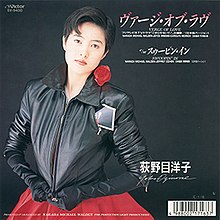Verge of Love (song)
| "Verge of Love" | ||||
|---|---|---|---|---|
 | ||||
| Single by Yōko Oginome | ||||
| from the album Verge of Love (Japanese Version) | ||||
| Language | Japanese | |||
| B-side | "Swoopin' In" | |||
| Released | January 18, 1989 | |||
| Recorded | 1988 | |||
| Studio | Tarpan Studios, San Rafael, California | |||
| Genre | ||||
| Length | 5:16 | |||
| Label | Victor | |||
| Songwriter(s) |
| |||
| Producer(s) | Narada Michael Walden | |||
| Yōko Oginome singles chronology | ||||
| ||||
| Music video | ||||
| "Verge of Love" on YouTube | ||||
"Verge of Love" (ヴァージ・オブ・ラヴ, Vāji obu Ravu) is the 17th single by Japanese singer Yōko Oginome. Written by Narada Michael Walden, Joyce Imbesi, and Carolyn Hedrich, with Japanese lyrics by Shintarō Hirai, the single was released on January 18, 1989, by Victor Entertainment. It was Oginome's first and only single to be recorded and produced in the U.S.[1][2]
Background and release
The song is the Japanese translation of the title track from Oginome's 1988 all-English album Verge of Love. Both "Verge of Love" and the B-side "Swoopin' In" were used as theme songs of the Fuji TV drama special Komarenai de! (こまらせないで!, Don't Let Me Down!), which also starred Oginome.
"Verge of Love" peaked at No. 5 on Oricon's singles chart. It also sold over 81,000 copies.[3]
Track listing
All music is arranged by Narada Michael Walden.
| No. | Title | Lyrics | Music | Length |
|---|---|---|---|---|
| 1. | "Verge of Love" (Vāji obu Ravu (ヴァージ・オブ・ラヴ)) | Shintarō Hirai |
| 5:16 |
| 2. | "Swoopin' In" (Suūpin In (スゥーピン・イン))) | Masao Urino |
| 5:20 |
| No. | Title | Length |
|---|---|---|
| 3. | "Verge of Love (Original Karaoke)" ((ヴァージ・オブ・ラヴ (オリジナル・カラオケ))) | |
| 4. | "Swoopin' In (Original Karaoke)" ((スゥーピン・イン (オリジナル・カラオケ))) |
Charts
| Chart (1989) | Peak
position |
|---|---|
| Oricon Weekly Singles Chart[4] | 5 |
| The Best Ten | 7 |
References
- ^ "Single Discography". Yōko Oginome Official Website. Retrieved July 9, 2021.
- ^ "ヴァージ・オブ・ラヴ | 荻野目洋子". Rising Production. Archived from the original on July 9, 2021. Retrieved July 9, 2021.
- ^ "荻野目洋子(シングル)". Yamachan Land (in Japanese). Archived from the original on May 24, 2011. Retrieved July 9, 2021.
- ^ 1968-1997 オリコン チャート・ブック (in Japanese). Tokyo: Oricon. 1997. p. 64. ISBN 4871310418.
External links
- Official website
- "Verge of Love" at MusicBrainz (list of releases)
- "Verge of Love" at Discogs
